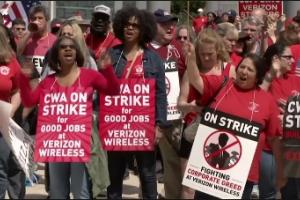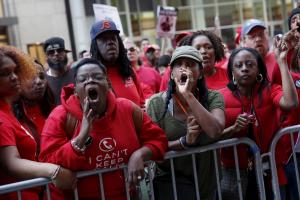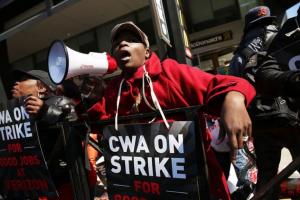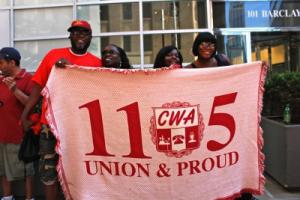Media Bits and Bytes – July 26, 2022
Portside
 Verizon workers went on strike one week before a competitive New York state primary in which a socialist is running. You had a credible national candidate for president on a nationally-televised debate calling out the CEO of a big corporation. That just does not happen very often. Given the current climate, Hillary Clinton made a big point of coming to our picket line the first day of the strike, Bill went to a picket line in Buffalo.
Verizon workers went on strike one week before a competitive New York state primary in which a socialist is running. You had a credible national candidate for president on a nationally-televised debate calling out the CEO of a big corporation. That just does not happen very often. Given the current climate, Hillary Clinton made a big point of coming to our picket line the first day of the strike, Bill went to a picket line in Buffalo.
 The actions by the Verizon workers show that it is possible to fight back against the power of employers to dictate the terms of the employment relationship. They remind us that the supremacy of big corporations, like technological changes and market forces, are not inevitable but reflect political and managerial choices. It appears workers are finally finding a way to counter the corporate strategies that have defined—and held back—the U.S. economy in recent decades.
The actions by the Verizon workers show that it is possible to fight back against the power of employers to dictate the terms of the employment relationship. They remind us that the supremacy of big corporations, like technological changes and market forces, are not inevitable but reflect political and managerial choices. It appears workers are finally finding a way to counter the corporate strategies that have defined—and held back—the U.S. economy in recent decades.
 If well organized and militant union members at Verizon—who have gone on strike against the company and its predecessors in 1983, 1986, 1989, 1998, 2000, 2004, 2011 and now—can’t stop the outsourcing and destruction of decent jobs, unorganized workers spread across the planet in industries like telecommunications will find the task insurmountable.
If well organized and militant union members at Verizon—who have gone on strike against the company and its predecessors in 1983, 1986, 1989, 1998, 2000, 2004, 2011 and now—can’t stop the outsourcing and destruction of decent jobs, unorganized workers spread across the planet in industries like telecommunications will find the task insurmountable.
 Corporate media coverage of the Verizon strike illustrates the fundamental asymmetry of power that still exists between multi-billion-dollar corporations and comparatively small unions. Due to the support of major Democrats like Bernie Sanders and (to a lesser extent) Hillary Clinton, the voices of strikers like those at Verizon are not entirely lost, but the deck is still heavily stacked in management's favor.
Corporate media coverage of the Verizon strike illustrates the fundamental asymmetry of power that still exists between multi-billion-dollar corporations and comparatively small unions. Due to the support of major Democrats like Bernie Sanders and (to a lesser extent) Hillary Clinton, the voices of strikers like those at Verizon are not entirely lost, but the deck is still heavily stacked in management's favor.
 Verizon in 2005 was nearly 70 percent union. Today it's about 27 percent.
"We cannot allow them to do what they are doing--and neither can the public," said newly elected CWA President Chris Shelton on the town hall call. "Because if they get away with it with us, they'll get away with it with everybody else, and there will be no more middle class in this country."
Verizon in 2005 was nearly 70 percent union. Today it's about 27 percent.
"We cannot allow them to do what they are doing--and neither can the public," said newly elected CWA President Chris Shelton on the town hall call. "Because if they get away with it with us, they'll get away with it with everybody else, and there will be no more middle class in this country."
 The loss of pensions at Boeing marks a major setback for unions, as employers typically follow the example of other employers at the bargaining table in terms of what constitutes a reasonable demand. Since the financial crash, unions have given up pensions for new hires at large, profitable, industry trendsetters such as General Electric, Verizon, Honeywell and now, Boeing.
The loss of pensions at Boeing marks a major setback for unions, as employers typically follow the example of other employers at the bargaining table in terms of what constitutes a reasonable demand. Since the financial crash, unions have given up pensions for new hires at large, profitable, industry trendsetters such as General Electric, Verizon, Honeywell and now, Boeing.
Spread the word